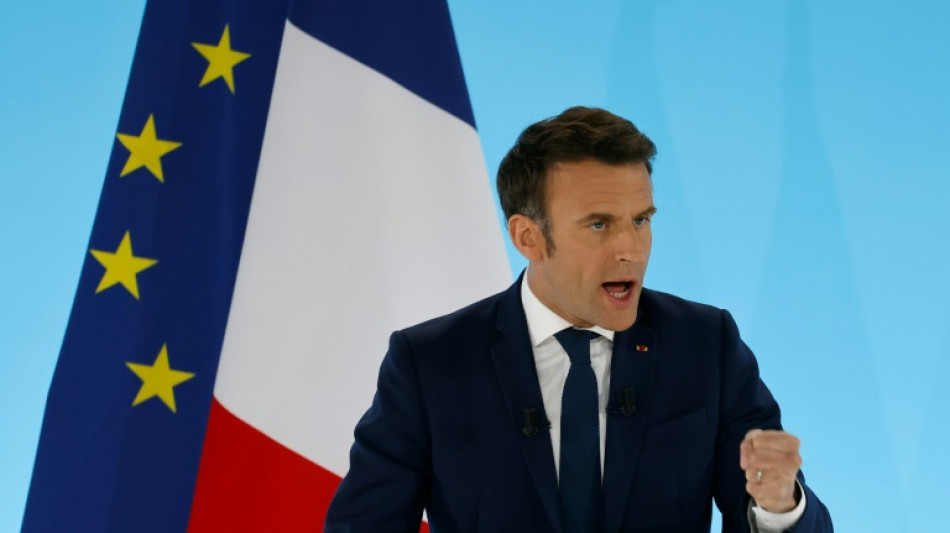
Macron, Le Pen to face run-off in French election battle

French President Emmanuel Macron was set to beat far-right leader Marine Le Pen in the first round of France's elections Sunday by a larger than expected margin, with the two rivals advancing to a run-off later this month.
Projections showed Macron scoring 28-29 percent in the first round with Le Pen on 23-24, setting up a re-run of their last battle in 2017 which is expected to be much tighter this time.
Despite entering the campaign late and holding just one rally before the vote, Macron performed more strongly than predicted by opinion polls and won immediate support on Sunday night from most of his defeated rivals ahead of the run-off.
"Make no mistake: nothing is decided. The debate that we are going to have over the next fortnight will be decisive for our country and Europe," he told cheering supporters at his campaign headquarters.
But he added: "When the far-right with all its forms is so high in our country, you can't say that things are going well," he said.
Far-left candidate Jean-Luc Melenchon was on track to come third with 20-21 percent, while the candidates for France's traditional parties of government -- the Socialists and the Republicans -- were on course for humiliating defeats and historic low scores.
Far-right pundit Eric Zemmour, a political newcomer running for the first time, was projected to win 6.5-7.1 percent.
New polls published on Sunday night suggested Macron would edge out Le Pen in the second round, but by a razor-thin margin of 51 versus 49 percent, according to one by the Ifop-Fiducial group. Another by Ipsos-Sopra Steria put them on 54 percent versus 46 percent.
- 'Fundamental choice' -
Bidding to be France's first woman president, Le Pen looked set for a higher first-round score than in 2017 and she will be able to pick up most of Zemmour's votes in the second round.
The 53-year-old said the run-off would present "a fundamental choice between two visions" with Macron representing "division, injustice and disorder... to the benefit of a few" against her plan for "social justice and protection" guaranteed by the nation state.
She said it would be a "choice of society and even of civilisation."
The election campaign has been overshadowed by the war in Ukraine, while surging prices of everyday goods have made the cost of living the overwhelming priority issue for voters.
The outcome of the two-stage election will have major implications for the European Union, which Le Pen says she wants to radically reform, as well as the US-led NATO military alliance during the biggest conflict in Europe since World War II.
"I want a France that places itself in a strong Europe, that continues to form alliances with the world's democracies to defend itself," Macron said Sunday.
"Not a France which, once out of Europe, would only have the international alliance of populists and xenophobes as allies. That's not us."
- Pivotal debate -
Macron announced Sunday night that he would be out campaigning on Monday in northern France, while Le Pen is set to meet her campaign team before resuming her months-long grassroots efforts in small town and rural France later in the week.
A pivotal moment in the next stage of the campaign will come on April 20 when the two candidates are set to take part in a TV debate broadcast live on national television and watched by millions.
The final debate has in the past had a crucial impact on the overall outcome, including in 2017 when Macron was widely seen as bettering a flustered Le Pen.
Although her opponents accuse her of being an extremist bent on dividing society, Le Pen has sought to project a more moderate image in this campaign and has focused on voters' daily worries over inflation.
But Macron is expected to target her past proximity with Russian leader Vladimir Putin, her policies on the EU, as well as the cost of her economic programme that includes massive tax cuts.
He also floated the idea Sunday night of a "large movement of political unity and action" and a "new method" of governing, which could see him invite rival parties to formally join his political movement.
Among the other candidates, Sunday's vote spelled humiliation for Socialist Anne Hidalgo, the mayor of Paris, who was projected to win 1.8-2.0 percent, a historic low for the party which was in power just five years ago under president Francois Hollande.
The vote for the right-wing Republicans party, headed by nominee Valerie Pecresse, also collapsed to an estimated 4.3-5 percent, down from 20 percent in 2017.
"The traditional parties have been smashed," said Jerome Jaffre, a political scientist at Sciences Po university in Paris.
Greens candidate Yannick Jadot was left disappointed with a projected score of under 5.0 percent.
- Tax cuts -
This marks the third time that a far-right candidate has made the run-off vote of a French presidential election, after Marine Le Pen's campaign in 2017 and the breakthrough by her father Jean-Marie in 2002 that shocked France.
Macron, who came to power aged 39 as France's youngest president, is bidding to be the first French president to win a second term since Jacques Chirac in 2002.
He would also seek to consolidate his position as the most influential leader in Europe after the departure of German chancellor Angela Merkel.
burs-adp-sjw/har
F.Harris--TNT